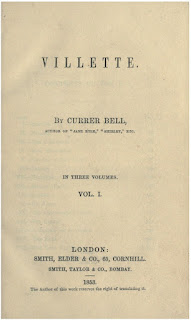Have
you ever looked in the mirror and seen one of your parents or grandparents? Or maybe
you have glimpsed a stranger, who seemed oddly familiar, and realised that you
were looking at a reflection of yourself in a plate-glass window? Such
experiences can be oddly unsettling. They suggest we are not “quite with it” – and
maybe are starting to lose our grip on reality.
Gothic
novels exploit such moments, along with ghosts and other supernatural events,
to undermine rational thought. “Walls between the past and the present … [and]
the living and the dead” break down in Gothic fiction, according to Simon
Marsden, a senior lecturer at the University of Liverpool.
In
his recent talk to the Brussels Brontë Group, In the Dead of Night, I
Suddenly Awoke – The Gothic Mode of Villette, Dr Marsden argued that this
sense of instability is inherent in Villette because Charlotte Brontë
saw it as essential for conveying the experiences of her heroine, Lucy Snowe.








